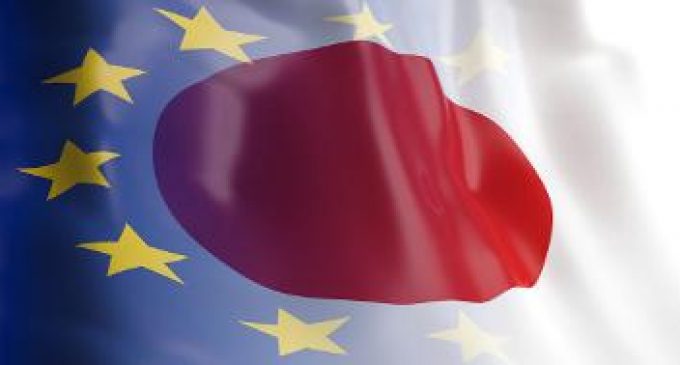EU and Japan Create the World’s Largest Open Trade Zone

The Economic Partnership Agreement (EPA) between the EU and Japan came into force on 1 February 2019. Businesses and consumers across Europe and in Japan can now take advantage of the largest open trade zone in the world.
The Economic Partnership Agreement removes the vast majority of the €1 billion of duties paid annually by EU companies exporting to Japan. Once the agreement is fully implemented, Japan will have scrapped customs duties on 97% of goods imported from the EU. The agreement also removes a number of long-standing non-tariff barriers, for example by endorsing international standards on cars. It will also break down barriers for key EU food and drink exporters to 127 million Japanese consumers and will increase export opportunities in a range of other sectors. Annual trade between the EU and Japan could increase by nearly €36 billion once the agreement is implemented in full.
The EU and Japan have agreed to set ambitious standards on sustainable development, and the text includes for the first time a specific commitment to the Paris climate agreement.
Key parts of the Economic Partnership Agreement
With regards to agricultural exports from the EU, the agreement will, in particular:
* scrap Japanese duties on many cheeses such as Gouda and Cheddar (which currently are at 29.8%) as well as on wine exports (currently at 15% on average);
* allow the EU to increase its beef exports to Japan substantially, while on pork there will be duty-free trade in processed meat and almost duty-free trade for fresh meat;
* ensure the protection in Japan of more than 200 high-quality European agricultural products, so called Geographical Indications (GIs), and the protection of a selection of Japanese GIs in the EU.
The agreement also secures the opening of services markets, in particular financial services, e-commerce, telecommunications and transport. It furthermore:
* facilitates to EU companies access to the procurement markets of 54 large Japanese cities, and removes obstacles to procurement in the economically important railway sector at national level;
* addresses specific sensitivities in the EU, for instance in the automotive sector, with transition periods of up to 7 years before customs duties are eliminated.
The agreement also includes a comprehensive chapter on trade and sustainable development; includes specific elements to simplify for small and medium-sized businesses; sets very high standards of labour, safety, environmental and consumer protection; strengthens EU and Japan’s commitments on sustainable development and climate change and fully safeguards public services.
Concerning data protection, the EU and Japan adopted decisions on 23 January of this year to allow personal data to flow freely and safely between the two partners. They agreed to recognise each other’s data protection systems as ‘equivalent’, which will create the world’s largest area of safe data flows.
President of the European Commission Jean-Claude Juncker said: “Europe and Japan are sending a message to the world about the future of open and fair trade. We are opening a new marketplace home to 635 million people and almost a third of the world’s Gross Domestic Product, bringing the people of Europe and Japan closer together than ever before. The new agreement will give consumers greater choice and cheaper prices; it will protect great European products in Japan and vice-versa, such as the Austrian Tiroler Speck or Kobe Beef; it will give small businesses on both sides the chance to branch out to a completely new market; it will save European companies 1 billion euro in duties every year and turbo-boost the trade we already do together. More than anything, our agreement shows that trade is about more than quotas and tariffs, or millions and billions. It is about values, principles and fairness. It makes sure that our principles in areas such as labour, safety, climate and consumer protection are the global gold-standard. This only happens when you work with the most natural of partners, separated by thousands of kilometres but united in friendship and values.”
Cecilia Malmström, Commissioner for Trade, said: “European companies will benefit from removed tariffs and simplified customs procedures. Our manufacturers, our service providers, our tech start-ups and our farmers all have something to celebrate. I am also proud that we have locked in our Paris climate deal commitments into a trade agreement for the first time, as well as setting high standards for workers’ rights and consumer protection. The stage is set for a significant boost in trade between us, which in turn creates jobs and lowers prices. It is now up to businesses and individuals to make the very most out of these new trade opportunities. We also count on all EU Member States to spread this message far and wide.”




















